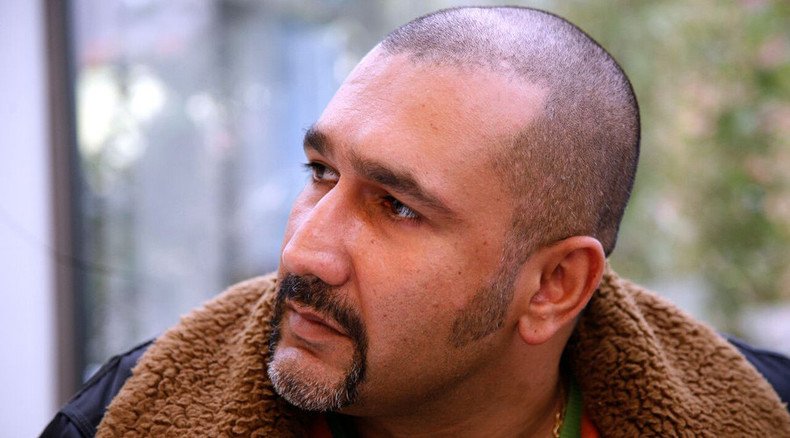'A Sinner in Mecca': Filmmaker receives death threats after documenting gay Muslim pilgrimage

A new documentary by a gay Muslim filmmaker shows the annual pilgrimage to Mecca from all sides – the good, the bad and the ugly. But the film has upset many within Islam, and the director has been the subject of death threats and an online hate campaign.
'A Sinner in Mecca' will go on cinema release in New York on Friday – but the story started almost four years ago.
The journey of Indian-born filmmaker Parvez Sharma began in 2011, when he embarked on the annual pilgrimage known as hajj. He says the timing was deliberate, taking place four months after Osama bin Laden was killed, and seven months after the Arab Spring began.
"I felt that it would be the most interesting time to go with all this churning going on in the Muslim world,” Sharma told AFP.
But that churning wasn't easily documented. Though Sharma managed to record footage on a mobile phone and two tiny cameras without the permission of Saudi authorities, he said his iPhone was taken by “religious police” early on, who deleted his early footage.
"These guys walk around with sticks and hit you if you're doing something they consider un-Islamic, and I was on the wrong end of the stick several times,” he said.
One of the five pillars of Islam, hajj is said to be an emotional journey for many. However, Sharma shows the intensity of the event, documenting the squash of people circling the Kaaba – the sacred site in whose direction Muslims pray.
Saudi Arabia’s 175 ‘mass judicial executions’ in 1 yr condemned by Amnesty http://t.co/QjH41JeIH1pic.twitter.com/yagUovf1Ct
— RT (@RT_com) August 25, 2015He also documents the discomfort of standing on a bus the entire night to go to Mount Arafat.
"There is nothing kind about this process," Sharma says in the documentary. He calls his first experience at the Kaaba “probably the most violent night of my entire life.”
Personal journey
While the film seeks to provide a raw account of the annual pilgrimage, it also showcases Sharma's personal journey as a gay Muslim, and his journey to reconcile his faith with his sexuality. The documentary includes footage of his wedding to his American husband in New York.
“My mother never forgave me for being gay,” Sharma says in the film. “I am now faced with a crisis of faith. I need to prove that I can be a good Muslim and be gay.”
Wahhabism: Religious deviance, fountainhead of radicalism & extremism (Op-Edge) http://t.co/uZESC43FO9pic.twitter.com/DsCMM9OMQZ
— RT (@RT_com) June 28, 2015“I'm going [to Saudi Arabia] to complete my hajj pilgrimage. Just like millions of Muslims before me have. The only difference with my hajj is that I'm going there as an openly gay man – an act that is punishable by death.”
The documentary has been called an “important and rare film” by David Savage of Cut Print Film, given the "threats of violence and death that have suppressed many of his fellow Muslim gays into hiding."
Screen Daily has referred to the film as “meaningful” and a “testament to courage.”
Though the film mostly focuses on Sharma, it also includes two other interviews. One of those is from an Arab man who complains that his wife was touched by other men. The second person, a man from Lahore, Pakistan, admits he is seeking atonement for taking part in a so-called “honor” killing.
Death threats
The trailer, which has gone viral in the Muslim world with 100,000 views on YouTube, has led to Sharma being accosted by yelling Saudi women at a festival in Britain.
It has also led to “extremely negative” reviews, Sharma told Indie Wire.
“That's a heavy burden to carry,” he said. “I did not expect this would happen so early in the life of the film. It's still newborn. I expected negative reaction. I didn't expect it so soon.”
Gay Muslim men joining #ISIS risk execution http://t.co/KbBavck3Wvpic.twitter.com/Evjw58pRry
— RT (@RT_com) May 12, 2015But even tougher for Sharma were the online death threats coming from servers in Pakistan and Saudi Arabia, AFP reported. He has also received a large amount of hate mail.
Days after the film premiered in April, Sharma says Iranian government propaganda websites said he was promoting a “disgusting act of homosexuality,” adding that the film was an “insult to Islam.”
But Sharma said he still hopes that “Muslims will eventually react positively” to his film.
Following its cinema release in New York on Friday, the documentary will be aired on European television and Netflix in the coming months. It has already been shown at film festivals in Britain and North America.












